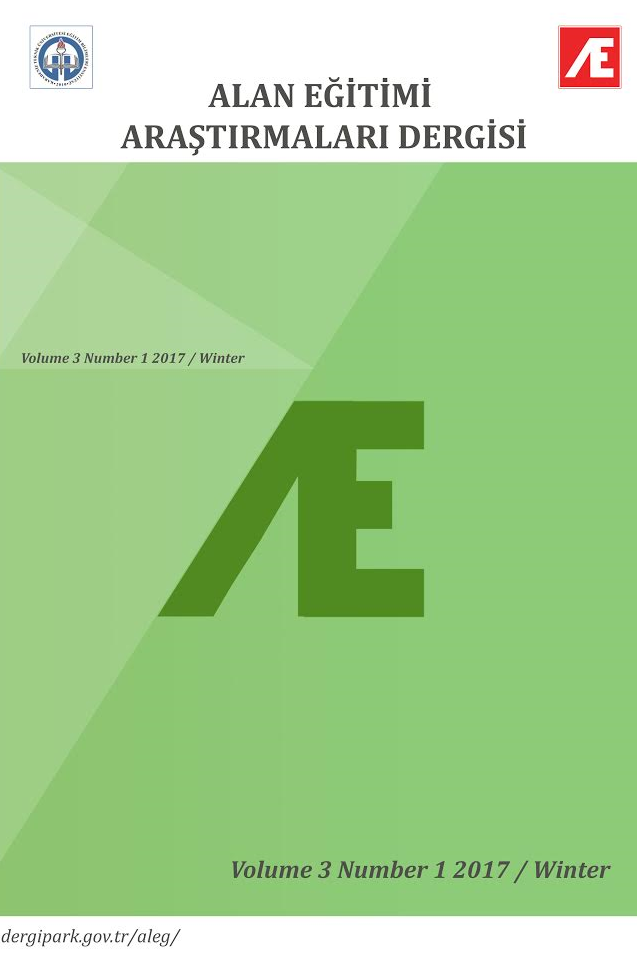Examination of Science Education Curriculum (5-8 grades) in terms of Entrepreneurial Characteristics
The pupose of this study was to investigate acquisitions, textbooks and workbook activities located in the science curriculum for 5-8 grades, in terms of entrepreneurial characteristics. This has been designed as a qualitative research study from data obtained via course documents, composed from textbooks and workbooks. The results show that the fifth grade science curriculum included more acquisitions related to entrepreneurial characteristics, according to other curriculums. However, it has been determined that the number of fifth grade acquisitions, like taking risks, teamwork, using time well and adapting to change, that would enable the improvement of their entrepreneurial characteristics, were quite small. When they looked at textbook acitivities, it was seen that there was no activity for improving the enabling characteristics of students, such as taking risks and adapting to change. Moreover, it was found that textbook acitivities are insufficient in terms of characteristics, like being innovative, to use the time well, to provide for acting independently. On the other hand, it was determined that through workbook activities are aimed at improving the creativity of students. Also, a small part of the workbook activities considered characteristics, like seeing opportunities, being innovative and self-confident. The biggest deficiency in the workbook activities is not taking into account characteristics, such as taking risks, using time well, teamwork, effective communication and adapting to change. It is thought that these results will shed light on curriculum development studies planned to be built after the 2013 science curriculum.
Anahtar Kelimeler:
Science Curriculum, Entrepreneurial Characteristics, Acquisitions, Textbook Activities, Workbook Activities
___
- Adeyemo, S. A. (2009). Understanding and acquisition of entrepreneurial skills: a pedagogical re-orientation for classroom teacher in science education, Journal of Turkish Science Education, 6(3), 57-65.
- Akyürek, Ç., & Şahin, Ç. (2013). İlkokul öğretmenlerinin girişimcilik becerisine ilişkin görüşlerinin değerlendirilmesi. Ekev Akademi Dergisi, 17(57), 51-68.
- Bacanak, A. (2013). Teachers’ views about science and technology lesson effects on the development of students’ entrepreneurship skills. Educational Sciences: Theory & Practice, 13(1), 623-629.
- Bolaji, O. A. (2012). Intergrating enterpreneurship education into science education: science teachers perspectives, Journal of Science, Technology, Mathematics and Education, 8(3), 181-187.
- Borase, C. (2014). The entrepreneurial teacher. Online International Interdisciplinary Research Journal, 4(5), 231-234.
- Buang, N. A., Halim, L., & Meerah, T. S. M. (2009). Understanding the thinking of scientists entrepreneurs: ımplications for science education in Malaysia. Journal of Turkish Science Education, 6(2), 3-11.
- Deveci, İ., & Çepni, S. (2014). Entrepreneurship in science teacher education, Journal of Turkish Science Education, 11(2), 161-188 doi: 10.12973/tused.10114a
- Deveci, İ., & Çepni, S. (2014). Entrepreneurship in science teacher education, Journal of Turkish Science Education, 11(2), 161-188 doi: 10.12973/tused.10114a
- Güven, S. (2009). New primary education course programmes and entrepreneurship. Procedia-Social and Behavioral Sciences, 1(1), 265-270.
- Güven, S. (2010). Hayat bilgisi dersi öğretim programlarının girişimcilik özellikleri açısından incelenmesi. E-Journal of New World Sciences Academy (Nwsa), 5(1), 50-57.
- ISSN: 2149-6269
- Başlangıç: 2015
- Yayıncı: Karadeniz Teknik Üniversitesi
